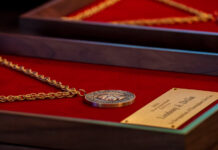
The University of Louisville and Louisville Presbyterian Theological Seminary announced 2024 recipients of five, $100,000 Grawemeyer Awards Dec. 4-8.
UofL presents the annual prizes in music, world order, psychology, education and religion and gives the religion prize jointly with the seminary. All of the 2024 winners will visit Louisville in April to give free, public talks on their winning ideas.
The winners are:
- Aleksandra Vrebalov, a Serbian-American composer who won the music prize for a chorale work transcending a single language, culture or religion to express how all life is interconnected
- Neta Crawford, a University of Oxford international relations scholar who won the world order prize for analyzing the Pentagon’s carbon footprint and its effect on climate change
- Ann Masten, a University of Minnesota child development scholar who won the psychology prize for finding that resilience comes from “ordinary magic” within us and our supportive connections with others
- Laura Hamilton and Kelly Nielsen, two University of California sociologists who co-won the education prize for exploring the racial consequences of funding cuts at public universities
- The Rev. Charles Halton, an Episcopal priest in Lexington, Ky., who explained how embracing God as a being with human qualities can inspire us to become better people
“The Grawemeyer Awards recognize highly constructive ideas with world-changing potential and that’s certainly true of the ideas we’re honoring this time.” said Marion Hambrick, the awards program’s executive director.
Vrebalov shows how music can unite us despite our differences, while Crawford sheds new light on the U.S. military’s role in climate change. Masten explains why some people recover quickly from major setbacks when others don’t. Hamilton and Nielsen call for a fairer way to fund the nation’s public universities and Halton offers a fresh perspective on spiritual growth.
UofL graduate Charles Grawemeyer created the Grawemeyer Awards in 1984 with an initial endowment of $9 million. The first award, music composition, was presented in 1985. Education was added in 1989, religion in 1990, world order in 1998 and psychology in 2000.
Grawemeyer distinguished the awards by honoring ideas rather than lifelong achievement, also insisting that laypeople as well as professionals take part in the selection process.































